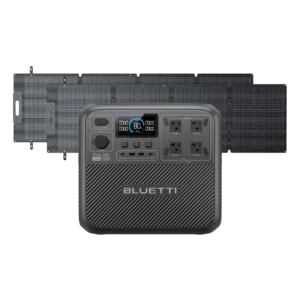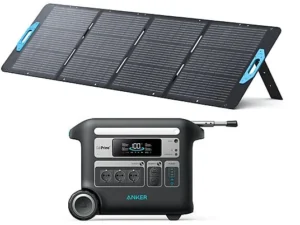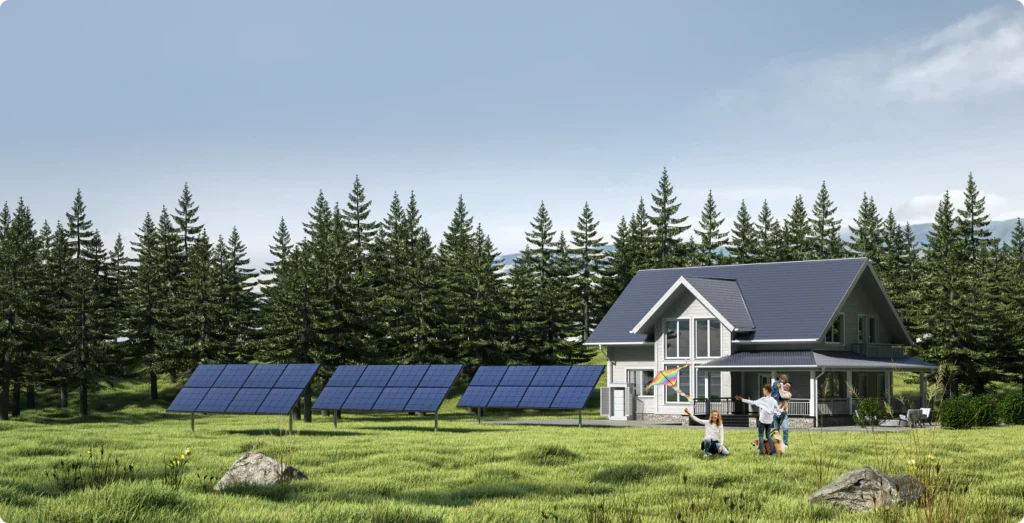Off-grid inverters are the most vital part of any stand-alone power system. They change DC power from solar panels or batteries into usable AC electricity. Increasingly, more people want to be energy-independent, whether living in remote cabins, vans full-time, or need emergency backup in their residence. As a result, choosing the right off-grid inverter is very important. In this review, we have compared and tested the best off-grid inverters of 2025, with a focus on in–use performance, compatibility, and value — specifically for US, UK, and Canadian consumers.
Whether you’re going off-grid full time, preparing for outages, or installing a hybrid solar system, this list has got you covered with the most efficient and reliable models. All of the items here are from trusted brands like EcoFlow, Bluetti, and Anker, whose cutting-edge technology makes off-grid living a breeze.
What Is an Off-Grid Inverter?
An off-grid inverter is a power inverter that does not depend on utility power. It inverts DC (direct current) power from solar panels or battery banks to AC (alternating current), the type that your home appliances use. Unlike grid-tie inverters, they do not need the electrical grid, making them perfect for living in remote areas, camping in recreational vehicles, or being part of a dependable backup system.
There are some new off-grid inverters with smart features such as app control, battery connection, surge protection, and UPS functionality.
How We Tested and Picked Inverters
To make sure that this guide is reliable, we evaluated more than twelve inverters against these factors:
Output wattage and surge capacity
Battery and solar panel compatibility
Efficiency and cooling system
Noise level (for indoor use)
Certifications (UL, CE, etc.) for US/UK/Canada compliance
Ease of installation and app support
We also considered value, build quality, and brand reputation — with a focus on EcoFlow, Bluetti, and Anker, all of which offer advanced, user-friendly solutions.
Top 5 Off-Grid Inverters for 2025
| Model | Power Output | Voltage Support | Best For | Price Range |
|---|---|---|---|---|
| EcoFlow DELTA Pro | 3600W (Surge 7200W) | 120V/240V | Whole-home backup | $$$$ |
| Bluetti AC200MAX | 2200W (Surge 4800W) | 120V | RVs, cabins | $$$ |
| Anker SOLIX F2000 | 2400W (Surge 3000W) | 120V | Portable setups | $$$ |
| Renogy 3000W Pure Sine | 3000W (Surge 6000W) | 12V/24V DC | DIY installations | $$ |
| Growatt SPF 5000 ES | 5000W | 230V (UK/EU) | Large off-grid homes | $$$ |
Disclosure: This post contains affiliate links. We could earn money from these links without costing you a cent extra.
1. EcoFlow DELTA Pro – Best for Home Backup

Featuring a gigantic 3.6kWh capacity (with expansion potential up to 25kWh), this inverter is ideal for residential purposes. This inverter will work with both 120V and 240V outputs, and so it will be US– and Canada-compatible. With a smart app, EV charging, and ultra-speed solar charging, this unit also has an edge of futureproofing.
In Canada? EcoFlow offers faster delivery and local support. Other countries can check if shipping is available to their region.
Get the EcoFlow DELTA Pro from EcoFlow’s official site
2. Bluetti AC200MAX – Best for Cabins & Off-Grid Living

A powerful but compact system with a 2,200W capacity and the ability to extend with additional batteries. Ideal for off-grid cabins or RVs, particularly with Bluetti’s intelligent control app and silent running.
Shop Bluetti’s latest AC200MAX here — often bundled with solar panels for extra value.
3. Anker SOLIX F2000 – Best for Portability & Everyday Use

Anker‘s 2400W inverter is compact, lightweight, and easy to use, making it perfect for portable off-grid installations. It solar or wall charges in under 2 hours and features pass-through charging.
Explore Anker’s F2000 on their official page for off-grid users needing mobility.
Voltage Considerations: US, UK, and Canada
- US & Canada: Standard voltage is 120V; homes may also require 240V for heavy appliances.
- UK & EU: The normal voltage is 230V. Ensure that you select an inverter like the Growatt SPF 5000 ES that is set for that range.
Always verify the voltage, frequency (50/60Hz), and whether the plug type will fit when buying inverters.
Setup & Sizing Tips
Choosing the correct size inverter is important:
Small homes/cabins: 2000–3000W
Large off-grid homes: 4000–6000W
RV or travel use: 1000–2400W
Also, ensure the inverter supports your battery bank’s voltage (12V/24V/48V) and has enough surge capacity for appliances like refrigerators or power tools.
FAQs
1. What is the inverter size required to power a small house?
Most small off-grid houses are fine with a 3,000–5,000W inverter. This provides sufficient power for lighting, refrigeration, internet, and small appliances.
2. Can an off-grid inverter be used as backup for a grid-tied house?
Yes, off-grid inverters such as the EcoFlow DELTA Pro perform fantastic for residential backup power, especially during outages.
3. Is a pure sine wave inverter better than a modified sine wave inverter?
Yes. Pure sine wave inverters are more suitable for sensitive electronics and operate more effectively. All the models recommended in this list are pure sine wave inverters.
Final Thoughts
Off-grid living is simpler and more reliable today, owing to powerful, intelligent inverters from leading manufacturers. Regardless of whether you need a compact inverter
for van life or a powerful backup for your house, these are the top off-grid inverters for 2025 that match what US, UK, and Canadian users require. Choose an inverter that fits your lifestyle, energy needs, and local electrical codes. For quality, long-lasting use, and new features, well-known brands like EcoFlow, Bluetti, and Anker offer the best off-grid performance available today. Check promotions and deals from our trusted partners for guaranteed assistance, warranty, and special packages.
Author
Top Solar Picks, founded by John, a Solar Energy Writer and Researcher with over 12 years of experience in renewable energy, is dedicated to helping homeowners and businesses make informed, data-driven decisions about solar power. John’s expertise and research pr...

